Audeze Mobius review: This gimmick-ridden headset doesn’t need the gimmicks to sound great - abarcaalts1960
Audeze is the modish vaunted headphones manufacturer to look over at the gambling headset commercialise and think, "We could do that." And why not? Play headsets get a bad rap even nowadays, derided for subpar uninjured quality and construction. It's natural that a company known for audiophile gear would recall it could do better.
The reality, per usual, is a bit more complicated. The Audeze Mobius does indeed nail the fidelity part of the equation, and is one of the go-to-meeting gambling headsets I've ever listened to. But it flubs a lot of details any gaming-initiative company would've prioritized—assault and battery spirit, cabling, controls, and more than.
So this is a passably dampened debut for Audeze's gaming ambitions. Connected the plus side, those shortcomings are relatively easy to fix when you've already nailed the fundamentals.
This followup is part of our roundupof best gaming headsets . Go in that location for details on competitory products and how we tested them.
Cheap luxury
Your first impressions of the Audeze Mobius will probably depend on how you approach it. Yes, right from the start we're in dissentious territory. Here are your two options: Given the $400 price tag, you either approach the Audeze Mobius as a very high-ending play headset Oregon as an equally low-toned-cease pair of audiophile headphones.
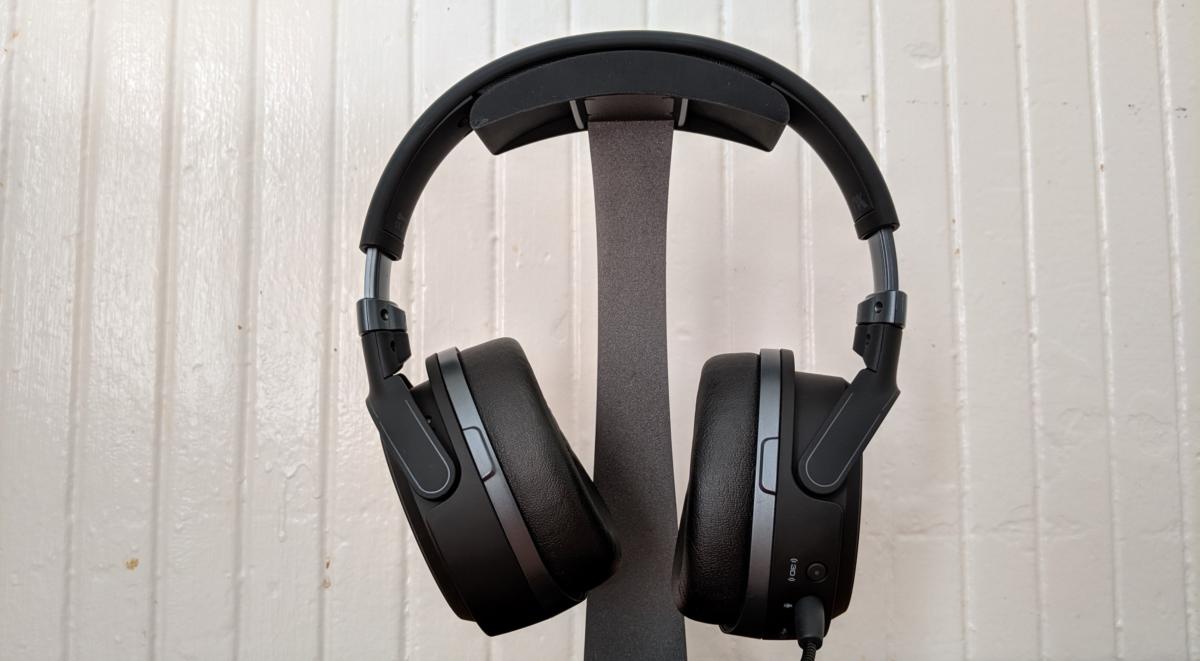 IDG / Hayden Dingman
IDG / Hayden Dingman Either viewpoint has its upsides and downsides. Personally, I flop in to the former camp and thus ilk its purpose. It's the extraordinary gambling headset you could wear KO'd and about without drawing too many foreign looks—Audeze's roots as a mainstream audio keep company pay Hera. It's bulky, as all all over-ear headsets are, simply the lines are cosher and slimming, and there's light ornamentation but nothing too tasteless—especially in the Carbon colorway we reviewed. But, I in reality like the Chromatic version even more. It's flashier for sure, just the highlights fascinate the eye without looking tacky, at any rate to me.
That said, it's rattling plastic. Nice plastic, sure, with a soft-touch finish that lends it a exchange premiu feel—the same tactic Alienware used for its AW988 headset. And if you're coming from another gambling headset, you mightiness not see the problem. Plastic headsets are the norm.
If you're expecting metal, wood, or former materials commonly found in high-end audio gear though, the Mobius is not going to cut it. Even the antimonial-looking hinges are revealed to be impressionable, once you have your hands along the headset. It looks visualise from afar, but the reality is less exciting.
Why? Because all the titillating bits are inside.
Plain to see
The Mobius occupies a weird niche, see: Inside the Audeze Mobius are planar magnetized drivers. Chances are, if you don't acknowledge what those are, you don't own any headphones that have them. This isn't the place for a long branch of knowledge explanation of how different speakers work, merely suffice IT to say, planar charismatic drivers generally produce a Sir Thomas More specific sound than the dynamic drivers in standard headphones.
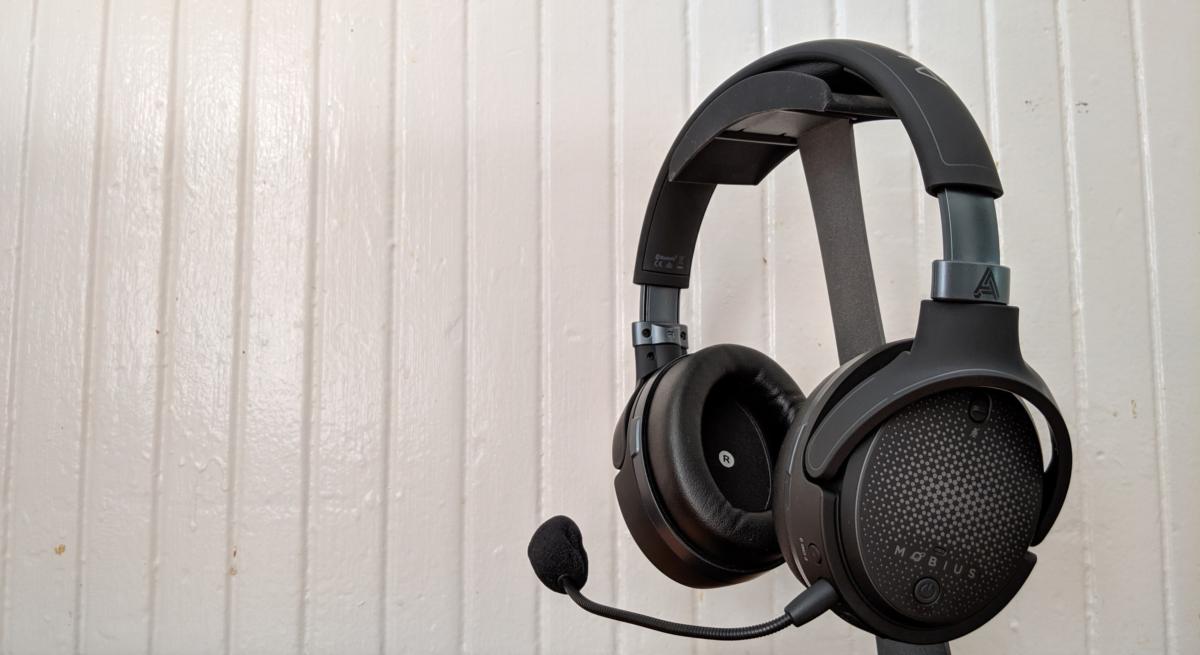 IDG / Hayden Dingman
IDG / Hayden Dingman There are tradeoffs, of course. Foremost, planar magnetic drivers tend to require Thomas More magnets than dynamic drivers do, hence the name. More magnets means additional weightiness, and I simulate that's partially why the August Ferdinand Mobiu uses much formative—to lighten the load in other areas. If true, IT's successful, weighing less than the Logitech G935 I had kicking about, for instance.
The other tradeoff is price. Dynamic drivers are—or at least can be—cheap. The $10 earbuds you sponsor the corner store and $500 Sennheisers use variations of this same technology, with differences in how the drivers are improved, in the potential for twisting, in bass presence, and so on. The point is, whatever your budget, you can find a mate of headphones with dynamic drivers to accommodate.
Planar magnetic drivers are expensive, especially historically. Fifty-fifty as prices have fare down, the Audeze Mobius's $400 terms dog remains at the lower destruction for this tech. Thusly we return to that earlier dissever, between the Mobius as high-end play headset or low-end audiophile gear.
Because here's the crux of it all: Audeze has ready-made a great pair of headphones.
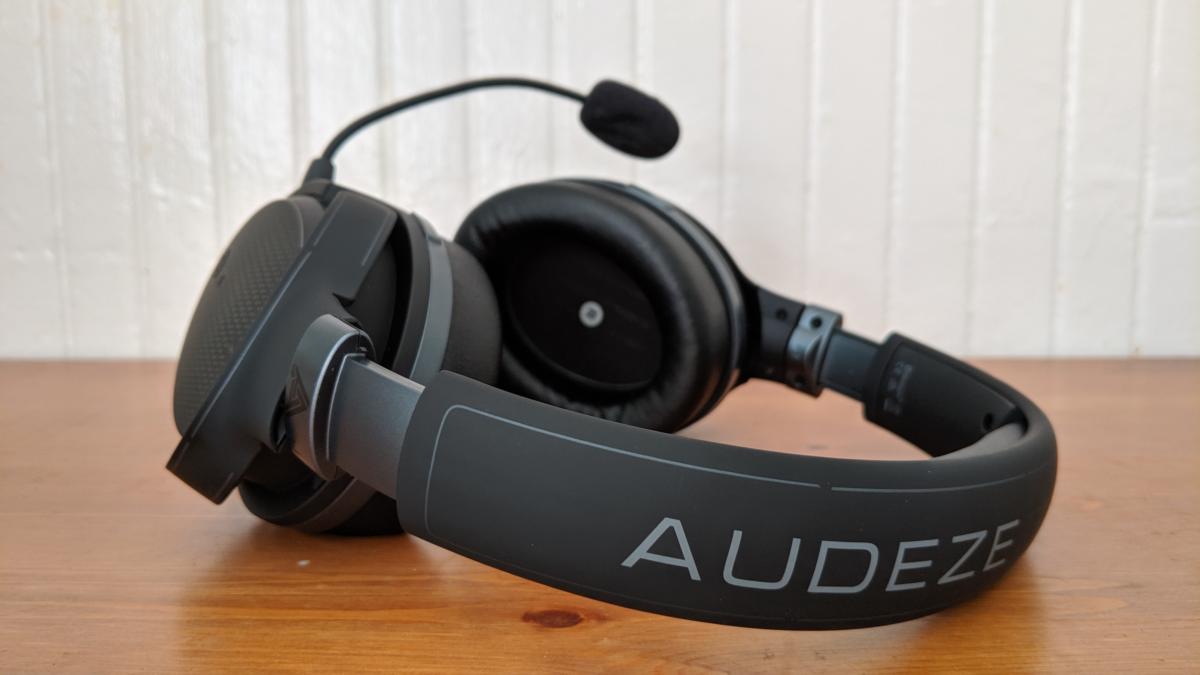 IDG / Hayden Dingman
IDG / Hayden Dingman Stunning actually, except for a few minor stumbles. I wish the reasoned were a bit wider, like I get from the aforesaid G935 or HyperX's Mist line. A it is, IT can be a bit hard to nail pull down tactical noises like footsteps and gunshots. Bass part presence is deficient American Samoa well when it comes to substantive explosions and other included-for-impact game noises. This is a common job with planars, every bit they Don River't move as much air as dynamics, and thus want the oomph you might require.
On that point are drawbacks to victimization the Audeze Mobius every bit a gaming headset, in other words. Just what the Mobius lacks in basso presence information technology gains in preciseness, with a sound that's non quite studio apartment monitor even but closer than most gaming headsets you'll discover. Music is particularly pleasant, clean but warm, translating the detail in every cymbal hit and bassline without sounding excessively unproductive. Games benefit from this As good, giving well-recorded dialogue room to flex.
Is it enough to justify a $400 price tag? I'm non sure. Gaming headsets have gotten better in recent years, especially Logitech's and HyperX's, and they're as wel attuned for gaming—more bass, more directionality. And, naturally, they'Re way cheaper also. You dismiss bring fort a pretty damn decent headset for $150 nowadays.
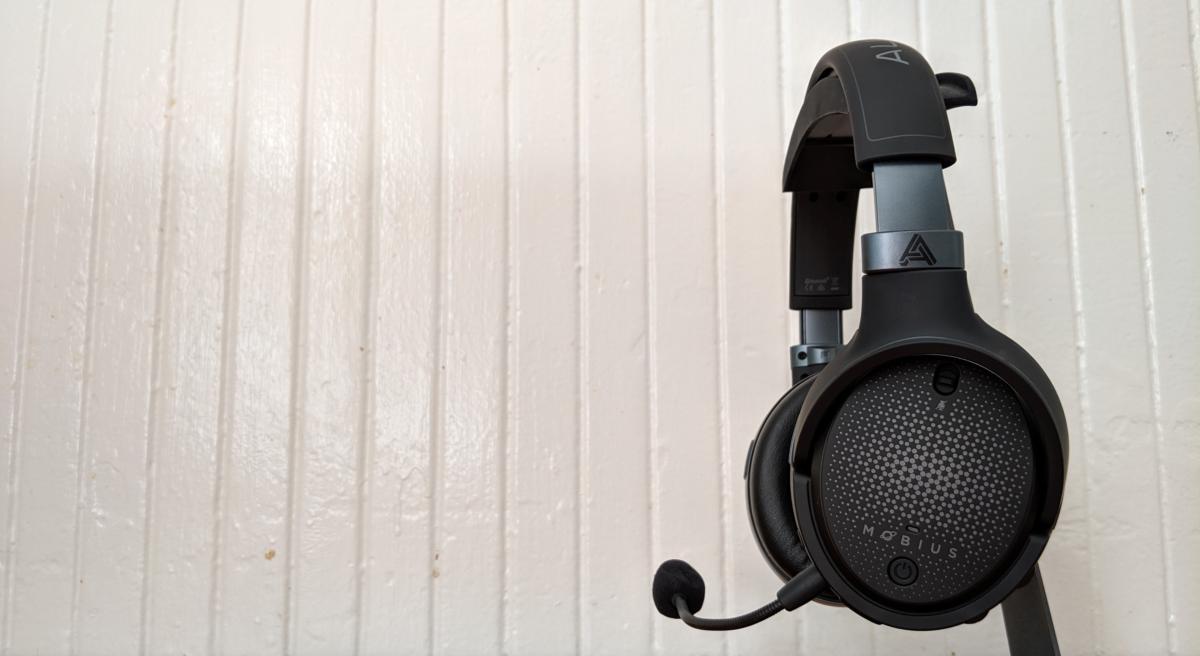 IDG / Hayden Dingman
IDG / Hayden Dingman The Audeze Mobius does sound grotesque though, and I also tend to weigh not just play but music, movies, and more when testing. If you're looking for something that can transition between each those fields at will, your options are much limited and I think Audeze fully justifies its price in that paying attention. IT's cardinal of the few one-stop headsets I own, and extraordinary of the only times I've seen a $400 gaming headset contend head-to-manoeuver with similarly priced headphones—at least on faithfulness. Build timbre, non so much, but the Audeze Mobius sounds every bit atomic number 3 well-heeled as its monetary value.
Snags
That said, there are issues that need sorting in a hypothetic Mobius V2, and it's why the score mightiness be a bit lower than you'd expect.
For one, assault and battery life is second-rate. The Mobius is actually a wired/receiving set intercrossed with Bluetooth capabilities. Audeze's ain estimates place the August Ferdinand Mobiu at 10 hours per burden, and I've found even that pocket-size bet a stretch. HyperX's Cloud Flight lasts upwards of 30 hours, and SteelSeries's Arctis 7 touts 24. Sure, neither sounds atomic number 3 opportune, but the Mobius is at a disfavour.
And doubly so since information technology's Bluetooth. Most wireless PC gaming headsets opt for 2.4GHz or 5GHz connections because they're more stable and pass better-quality sound. The Mobius is fine for insouciant telephone set hearing, maybe on your commute, only information technology's tentative you'd use it as a Bluetooth headset at home—particularly if you contrive to use the microphone too, which farther complicates next audio. It's not a wireless headset actually. It's a wired headset that happens to have Bluetooth capabilities in a mite.
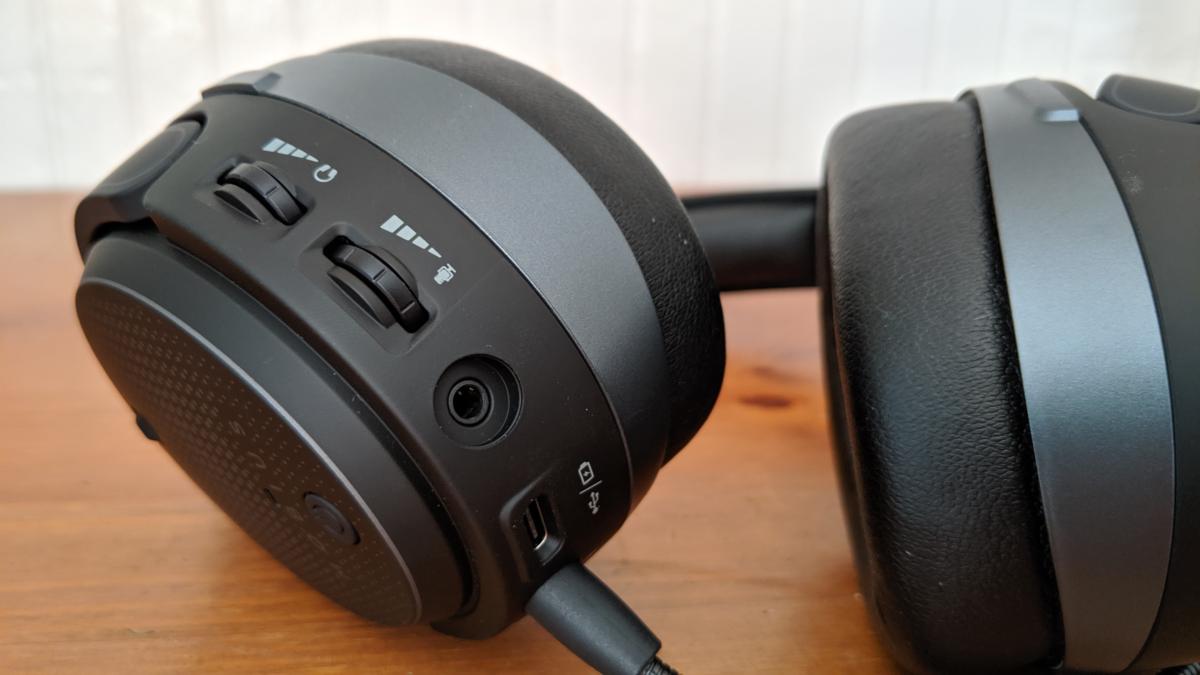 IDG / Hayden Dingman
IDG / Hayden Dingman If you're seated at your desk, you're departure to use the included cabling—but hither Audeze stumbles likewise, with cables that are just too damn short for desktop use. The USB-A to USB-C cable Audeze intends you to use is only quaternary feet long. Put IT this style: My desktop sits right next to my lead on the floor, and I found myself tugging against the limits of the cabling at times even with the Mobius plugged into the front panel.
The alternate 3.5mm to USB-C cable is equally modification, and to lend insult to injury, also terminates in a single connection rather than the dual mic/headphones ending required by most desktop PCs. Audeze's testimonial? Source a splitter yourself. I find it a bit funny that a $400 headset doesn't include the basic 50-cent adapter that comes with, articulate, HyperX's $60 Cloud posture.
Last but not least, the microphone is underwhelming, prone to plosives and way noise. It's functional, which I guess makes this a headset and not just fancy headphones, but you bottom find better microphones on headsets a third the price. Given you devote a premium for the Mobius, I expected better.
…And stunts
There's also one final feature I harbor't touched on until now, and it's because…advisable, IT feels like a gimmick—the irony being, it's the reason I sourced an Audeze August Ferdinand Mobiu follow-up whole to begin with.
The Mobius features what Audeze calls "3D Audio." And zero, IT's non just a fancy Scripture for surround sound, or leastways non the path you're thinking. Basically what Audeze has done, with the assistanc of Waves Nx, is simulate a roomful of speakers inside Mobius.
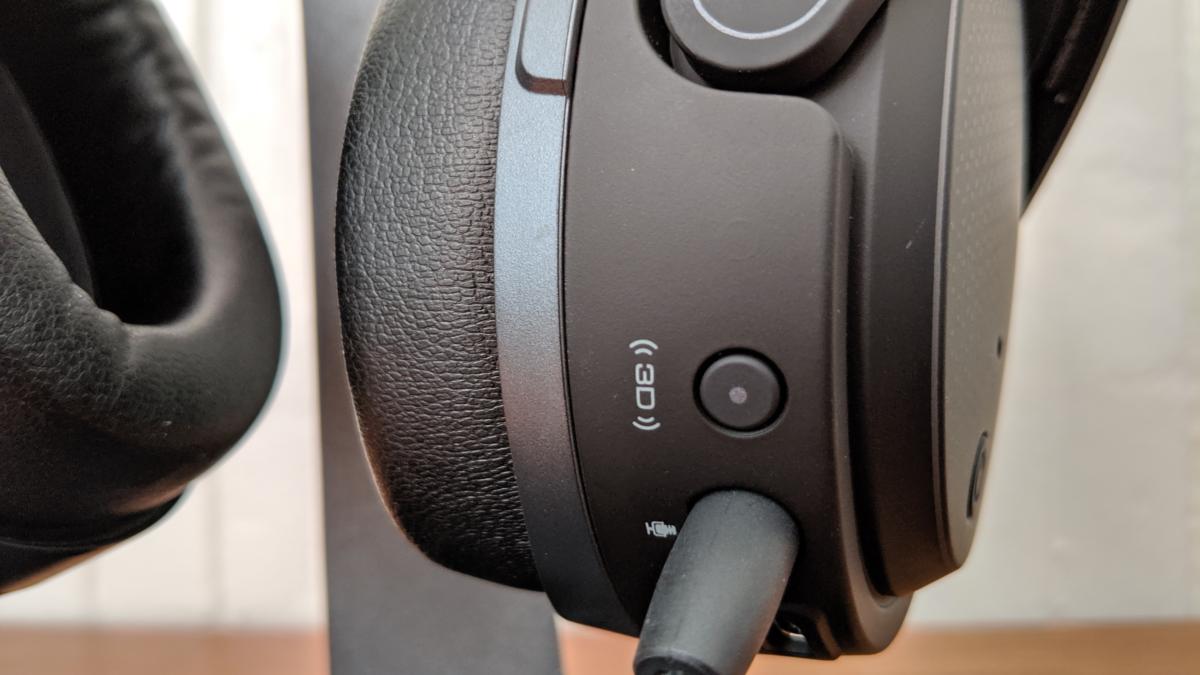 IDG / Hayden Dingman
IDG / Hayden Dingman "But wait, isn't that what software-driven 7.1 surround does?" Intimately, yes and no. See, your emblematic 7.1 headset mimics a full moon speaker unit setup, but attaches it to your straits. When you move, the speakers move too. Sounds are relative to where you're looking in-crippled, so a shot fired to your left will e'er come from the left-of-center ear. Makes sense, right? And the August F. Mobius will do this form of 7.1 if you'd like (and does IT fountainhead, I might add).
The Mobius also tracks your channelise movements though. If person's firing a gun to your left in-game and you turn your manoeuvre in this steering, you'll hear the gunshots inherit direction.
The Mobius quite literally mimics a room full of speakers. Conceive of you put a 7.1 setup in your living-room, switched along a film, and then you turned around to gaze at the wall across from your TV. Your speakers don't go down with you, right? Sounds that should come from the left will appear to come from your right, the center channel is behind you, and thus on.
IT's real tidy when you archetypical put the Mobius on, and I had a good time swiveling my head left-of-center-to-right to hear euphony pan from one ear to the other. I'd be hard-pressed to say it's functional though. Guess what happens when you take heed an blowup off to your left and you turn your head that direction in real life? Unless you have the most ultrawide of ultrawide monitors, you are straightaway looking at a paries, or maybe come out a window if you're lucky.
In any case, the point is you're not look your screen, which makes this feature near useless in any factual-world scenario. I wouldn't bid information technology a dealbreaker, A it's easy enough to handicap and go about your day. Only I certainly wouldn't call it a value-add either, nor a reason to pass $400 connected a headset.
Bottommost crease
So what is the reason? The sound quality, plain and simple. The Audeze Mobius does sound off damn good, and I've enjoyed gambling on it, watching movies and TV with it, and (most of all) listening to music. There are fewer gaming headsets that measure up, and while I might prefer for a headset that improve balances audio quality with quality-of-life features—true receiving set performance, a better battery, better construction—I still think the Mobius deserves a nod for its faithfulness exclusively.
Of course, a Mobius that rectifies even a a few of the comparatively simple issues I encountered would do fifty-fifty major at justifying its last sticker price. For a first time outing though? It's impressive, and I'm curious to see what Audeze does from here.
Source: https://www.pcworld.com/article/397688/audeze-mobius-gaming-headset-review.html
Posted by: abarcaalts1960.blogspot.com


0 Response to "Audeze Mobius review: This gimmick-ridden headset doesn’t need the gimmicks to sound great - abarcaalts1960"
Post a Comment